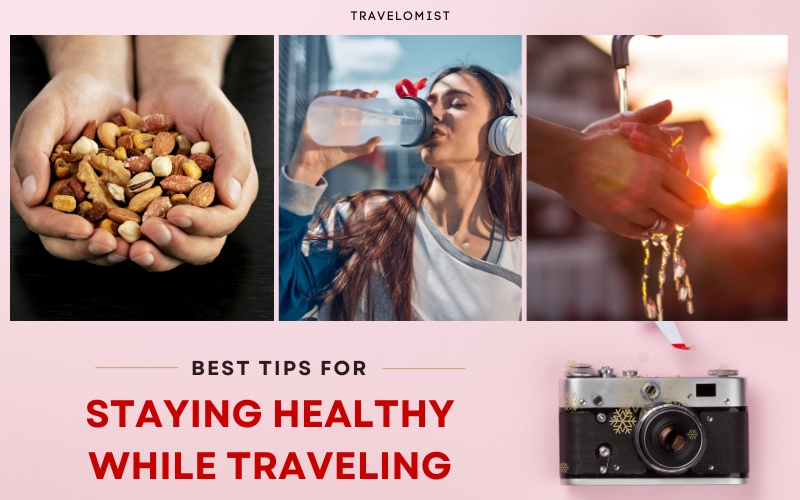Traveling is an exciting and enriching experience that allows us to explore new places, cultures, and create lasting memories. However, amidst the excitement, it’s crucial not to overlook the importance of maintaining our health. Whether you’re embarking on a short weekend getaway or a long-term adventure, prioritizing your well-being can significantly enhance your travel experience and ensure you make the most of your time away from home.
Table of Contents
ToggleTraveling often involves being exposed to different environments, climates, and sometimes even time zone changes. These factors can place additional stress on our bodies, making it essential to take care of our physical health while on the road.
Click here to read: Why Travel Is Important
When we travel, we encounter new germs and pathogens to which our bodies may not be accustomed. Maintaining a strong immune system through healthy habits can help protect us from falling ill and ensure a smoother travel experience.
Exploring new destinations requires energy and stamina. By taking care of our physical health through proper nutrition, hydration, and exercise, we can enhance our endurance, allowing us to make the most of our travel adventures.
Top Tips On How To Stay Healthy
Here are some best ways to stay healthy while travelling:
Drink Plenty Of Water
Staying hydrated is a crucial aspect of maintaining good health while traveling. Proper hydration helps support your body’s functions, boosts energy levels, and promotes overall well-being. Here are some effective tips to help you stay hydrated during your travels:
Carry a Reusable Water Bottle: Invest in a durable, reusable water bottle that you can take with you wherever you go. Having a water bottle on hand makes it easier to stay hydrated throughout the day. Look for one that is convenient to carry, leak-proof, and has a sufficient capacity to hold an ample amount of water.
Drink Water Regularly: Make a conscious effort to drink water regularly, even if you’re not feeling thirsty. It’s easy to get caught up in the excitement of travel and forget to hydrate. Set reminders on your phone or watch to prompt you to drink water at specific intervals. Aim to drink at least eight glasses of water per day, or more if you’re in a hot or humid environment.
Take Advantage of Water Opportunities: Whenever you come across a water source, take advantage of it to refill your water bottle. Airports, hotels, restaurants, and public facilities often have water dispensers or drinking fountains available. Use these opportunities to top up your water supply and ensure you have access to clean and safe drinking water.
Be Mindful of Beverages: While it’s tempting to indulge in sugary drinks, caffeinated beverages, or alcohol while on vacation, they can contribute to dehydration. Be mindful of your beverage choices and try to limit the consumption of these drinks. If you do indulge, make sure to balance it out by drinking extra water to compensate for the dehydrating effects.
Consume Hydrating Foods: In addition to drinking water, you can also incorporate hydrating foods into your diet. Fruits and vegetables with high water content, such as watermelon, cucumbers, oranges, and strawberries, can contribute to your overall hydration. Pack these snacks or seek them out at local markets or grocery stores during your travels.
Stay Hydrated during Flights: Airplane cabins have low humidity levels, which can lead to dehydration. Drink water before, during, and after your flight to counteract the dry air. Avoid excessive consumption of caffeinated or alcoholic beverages during flights, as they can further contribute to dehydration. Consider bringing a small bottle of water on board or asking for water from the flight attendants when needed.
Remember, staying hydrated is essential not only for your physical health but also for your overall well-being while traveling. By implementing these tips and making hydration a priority, you can enjoy your journey to the fullest and maintain your health throughout your adventures.
Pack Healthy Snacks
When you’re traveling, having a stash of healthy snacks on hand is a smart way to fuel your body with nutritious options and avoid relying on unhealthy fast food or sugary treats. Here are some tips for packing and enjoying healthy snacks during your travels:
Choose Nutrient-Dense Foods: Opt for snacks that are packed with nutrients to keep you energized and satisfied. Include a mix of protein, healthy fats, and complex carbohydrates in your snack choices. Some excellent options include nuts and seeds, trail mix, granola bars, fresh or dried fruits, whole grain crackers, and pre-cut vegetables with hummus or nut butter.
Pack Portable and Non-Perishable Snacks: Select snacks that are easy to carry, require no refrigeration, and won’t easily get crushed in your bag. This way, you can have them readily available whenever hunger strikes, whether you’re on a plane, in a car, or exploring a new destination. Consider individually wrapped or portioned snacks for convenience and freshness.
Prepare Homemade Snacks: Consider making your own snacks before you embark on your journey. This way, you have control over the ingredients and can customize them to your preferences. Prepare items like homemade energy balls, granola bars, or kale chips, using wholesome ingredients that provide a balance of nutrients and flavors.
Mindful Snacking: Practice mindful eating by paying attention to your hunger and fullness cues. Snack when you genuinely feel hungry, not out of boredom or as a distraction. Take the time to savor and enjoy your snacks, focusing on the taste and texture. This mindful approach helps you appreciate your food and prevents overeating.
Be Mindful of Allergies and Restrictions: Consider any dietary restrictions or allergies you may have when choosing your snacks. Look for options that are suitable for your specific needs, such as gluten-free, dairy-free, or vegan snacks. Read labels carefully and research local food regulations if you’re traveling internationally.
Research Local Options: While it’s important to pack your own snacks, part of the travel experience is also exploring local food options. Research the destination beforehand to identify healthy local snacks that you can try. This way, you get to indulge in the local cuisine while still making nutritious choices.
Remember to plan ahead and pack enough snacks for the duration of your trip, taking into account travel time, layovers, and any unexpected delays. Having a variety of healthy snacks readily available will keep your energy levels stable, satisfy cravings, and help you maintain a balanced diet while on the go.
Practice Good Hand Hygiene
Maintaining proper hand hygiene is crucial to prevent the spread of germs and protect your health while traveling. Here are some essential tips for practicing good hand hygiene during your journeys:
Wash Your Hands Regularly: Wash your hands with soap and clean running water for at least 20 seconds. This is especially important before and after eating, using the restroom, or touching surfaces that may be contaminated. Use handwashing as an opportunity to thoroughly clean your palms, the back of your hands, between your fingers, and under your nails.
Carry Hand Sanitizer: In situations where soap and water are not readily available, use an alcohol-based hand sanitizer with at least 60% alcohol content. Apply enough sanitizer to cover all surfaces of your hands and rub them together until dry. Hand sanitizer can be especially handy during long flights, bus rides, or when you’re exploring areas with limited access to washing facilities.
Avoid Touching Your Face: Be mindful of avoiding touching your face, particularly your eyes, nose, and mouth. These areas are entry points for germs and can increase the risk of infection. If you need to touch your face, make sure to clean your hands beforehand to minimize the transfer of bacteria or viruses.
Carry Hand Wipes or Tissues: Pack a small supply of disposable hand wipes or tissues for additional cleanliness. These can come in handy when you need to clean your hands or wipe surfaces that you’ll be in contact with, such as airplane tray tables, door handles, or public transportation handrails.
Use Caution in Public Restrooms: Public restrooms can be breeding grounds for germs. When using them, be cautious and follow these steps for optimal hygiene:
- Use a tissue or paper towel to touch surfaces like door handles or faucets.
- Properly dispose of used tissues in designated bins.
- Wash your hands thoroughly with soap and water after using the restroom.
Carry Travel-Sized Hand Soap: Consider carrying a small container of travel-sized hand soap. This way, you can ensure access to soap even in situations where it may not be readily available, such as when camping, hiking, or staying in accommodations without provided toiletries.
Remember, practicing good hand hygiene is an effective way to reduce the risk of illness while traveling. By making it a habit to clean your hands regularly, you protect yourself and those around you from harmful germs and maintain a healthier travel experience.
Enough Sleep
Getting sufficient sleep is vital for maintaining your health and well-being while traveling. Quality sleep helps rejuvenate your body, boosts your immune system, and enhances your overall travel experience. Here are some tips to ensure you get enough sleep during your travels:
Stick to a Sleep Schedule: Try to maintain a consistent sleep schedule, even when you’re away from home. Going to bed and waking up at the same time each day helps regulate your body’s internal clock and promotes better sleep quality. Consider adjusting your sleep schedule gradually before your trip to adapt to different time zones.
Create a Restful Sleep Environment: Make your sleep environment as comfortable and conducive to sleep as possible. Use earplugs, an eye mask, or a white noise machine to block out any disruptive sounds or light. If you’re sensitive to unfamiliar surroundings, consider bringing your own pillow or a familiar item that helps you feel more at ease.
Choose Accommodations with Sleep in Mind: When booking accommodations, consider factors that contribute to a good night’s sleep. Look for accommodations with comfortable beds, blackout curtains, and soundproofing if possible. If you’re a light sleeper, consider requesting a quiet room away from elevators, ice machines, or other sources of noise.
Establish a Pre-Sleep Routine: Develop a relaxing pre-sleep routine to signal to your body that it’s time to wind down. Engage in calming activities such as reading a book, listening to soft music, or practicing gentle stretching or meditation. Avoid using electronic devices, as the blue light can interfere with your body’s natural sleep-wake cycle.
Limit Stimulants and Heavy Meals: Avoid consuming stimulants such as caffeine and nicotine close to bedtime, as they can disrupt your sleep. Additionally, be mindful of heavy or spicy meals before bed, as they can cause indigestion or discomfort that may interfere with sleep. Opt for lighter, well-balanced meals in the evening.
Incorporate Exercise into Your Day: Regular physical activity can help improve sleep quality. Engage in exercise or physical activities during the day to expend energy and promote better sleep at night. However, avoid vigorous exercise too close to bedtime, as it may stimulate your body and make it harder to fall asleep.
Manage Jet Lag: If you’re traveling across different time zones, jet lag can disrupt your sleep patterns. Minimize the effects of jet lag by adjusting your sleep schedule before you travel, exposing yourself to natural light during the day, and staying hydrated. Consider gradually adapting to the local time zone upon arrival to help your body adjust more smoothly.
Prioritizing enough sleep while traveling allows you to feel rested, rejuvenated, and ready to make the most of your adventures. By implementing these tips, you can ensure that your sleep is restorative and contribute to a healthier travel experience overall.
Handful Of Nuts
Including a handful of nuts in your travel snack arsenal is a smart and healthy choice. Nuts are packed with nutrients, provide a good source of energy, and are easy to carry with you on the go. Here are some reasons why nuts make a great travel snack:
Nutrient-Dense Powerhouses: Nuts are loaded with essential nutrients such as healthy fats, protein, fiber, vitamins, and minerals. They provide a well-rounded nutritional profile that can help keep you satisfied and nourished during your travels.
Sustained Energy: The combination of healthy fats, protein, and fiber in nuts helps provide a steady release of energy, keeping you fueled throughout your journeys. Unlike sugary snacks that lead to energy crashes, nuts provide a longer-lasting and more sustainable source of energy.
Portable and Convenient: Nuts are incredibly convenient to pack and carry. They require no refrigeration and are resistant to crushing, making them an ideal choice for travel. Pack a small resealable bag or container with a variety of nuts, such as almonds, walnuts, cashews, or pistachios, and have them readily available whenever hunger strikes.
Curbs Hunger and Cravings: Nuts are satiating and can help curb hunger pangs between meals. Their high protein and fiber content promote feelings of fullness, reducing the likelihood of unhealthy snacking or overeating. By including nuts in your snack repertoire, you can maintain better control over your appetite and make healthier food choices.
Nutritional Variety: Different types of nuts offer unique nutritional benefits. For example, almonds are rich in vitamin E and calcium, while walnuts are high in omega-3 fatty acids. Including a variety of nuts in your snack mix ensures you benefit from a diverse range of nutrients.
Heart-Healthy Benefits: Nuts have been associated with numerous health benefits, particularly for heart health. Their healthy fats, including monounsaturated and polyunsaturated fats, can help reduce cholesterol levels and lower the risk of heart disease. By incorporating nuts into your travel snacks, you’re making a heart-healthy choice.
Remember to practice portion control when enjoying nuts, as they are calorie-dense. A small handful (about 1 ounce or 28 grams) is typically a good serving size. Additionally, be mindful of any nut allergies or dietary restrictions that may apply to you or your fellow travelers.
By including a handful of nuts in your travel snack repertoire, you’re choosing a nutritious, portable, and satisfying option that can keep you nourished and energized during your adventures.
Conclusion
Maintaining your health while traveling is essential to ensure an enjoyable and stress-free journey. By following the best tips for staying healthy while on the go, you can prioritize your well-being and make the most of your travel experiences.
From staying hydrated to packing healthy snacks, practicing good hand hygiene, getting enough sleep, and including a handful of nuts in your snack repertoire, each aspect contributes to your overall health and well-being while traveling.
By incorporating these practices into your travel routine, you’ll not only feel better physically but also enhance your overall travel experience. Taking care of your health allows you to fully immerse yourself in new cultures, explore exciting destinations, and create lasting memories.
Remember, your health is a valuable asset, and by prioritizing it during your travels, you can embark on your journeys with vitality, enthusiasm, and peace of mind. So, as you plan your next adventure, make sure to keep these tips in mind and enjoy a healthy and fulfilling travel experience.












